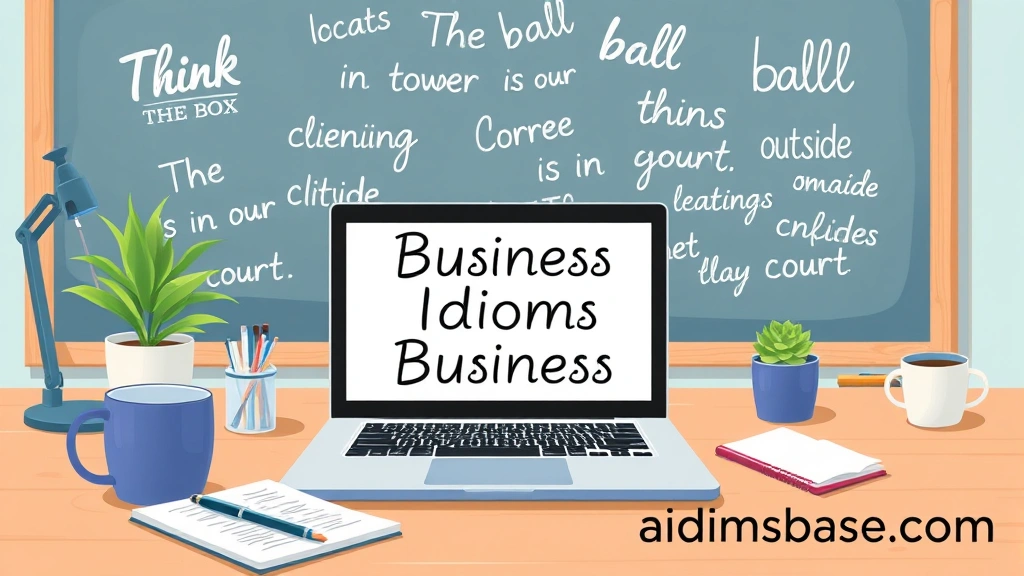Hello there, future business communication superstar! Have you ever found yourself in a business meeting, hearing phrases that sound a bit like a secret code? Or perhaps you’ve wanted to express a complex idea concisely but just couldn't find the right words? Well, you're in for a treat! Business idioms are like little power-ups for your language, helping you sound more natural, professional, and confident in the global marketplace.
Learning these idioms isn't just about memorizing phrases; it's about understanding the nuances of business culture and communication. Whether you're pitching an idea, negotiating a deal, or simply chatting with colleagues, these 35 idioms will help you navigate conversations with ease and flair. So, let’s dive in and unlock the secrets to sounding like a true business insider!
35 Essential Business Idioms You Need to Know
Ready to supercharge your business vocabulary? Here are 35 fantastic idioms that will make your communication shine, along with clear explanations and examples to help you master them.
Idioms for Strategy and Planning
These idioms are perfect for discussions about direction, goals, and how to get things done.
-
Big Picture: This refers to the overall perspective or the most important aspects of a situation, rather than the details.
- Example: "Before we dive into the specifics, let's look at the big picture of our marketing campaign."
-
Blue Sky Thinking: This means thinking creatively and without limits, often used in brainstorming sessions.
- Example: "For our next product, we need some serious blue sky thinking to come up with innovative features."
-
To Get the Ball Rolling: To start an activity or process.
- Example: "Let's get the ball rolling on this project by scheduling our first team meeting."
-
To Touch Base: To briefly make contact with someone, often to update or check in.
- Example: "I'll touch base with you next week to see how the client presentation went."
-
To Think Outside the Box: To think creatively and unconventionally.
- Example: "Our competitors are doing well, so we need to think outside the box to gain an advantage."
Idioms for Performance and Progress
These phrases help describe how things are going, whether good or bad.
-
To Be Ahead of the Curve: To be more advanced or progressive than others.
- Example: "Our company is ahead of the curve in adopting sustainable practices."
-
To Be Back to Square One: To have to start again from the beginning after a failure or setback.
- Example: "The client rejected our proposal, so we're back to square one with our design."
-
To Be on the Same Page: To be in agreement or have the same understanding.
- Example: "Before we proceed, let's ensure everyone is on the same page regarding the project timeline."
-
To Bring to the Table: To contribute something valuable to a discussion or project.
- Example: "Sarah really brings a lot to the table with her extensive experience in digital marketing."
-
To Cut Corners: To do something in the easiest, quickest, or cheapest way, often sacrificing quality.
- Example: "We can't afford to cut corners on product safety; it could damage our reputation."
-
To Go the Extra Mile: To make a special effort; to do more than is expected.
- Example: "Our customer service team always goes the extra mile to ensure client satisfaction."
-
To Hit the Ground Running: To start a new activity or job with great energy and success.
- Example: "Our new sales manager really hit the ground running and closed two deals in her first week."
Idioms for Challenges and Solutions

When you're facing obstacles or finding solutions, these idioms come in handy.
-
To Bite the Bullet: To endure a difficult or unpleasant situation.
- Example: "We have to bite the bullet and invest in new software, even though it's expensive."
-
To Call the Shots: To be in charge or to make the important decisions.
- Example: "As the project lead, Mark calls the shots on all major decisions."
-
To Get Your Ducks in a Row: To organize your things or plans properly.
- Example: "Before launching the new product, we need to get our ducks in a row regarding logistics."
-
To Go Belly Up: To fail completely; to go bankrupt.
- Example: "Many small businesses went belly up during the economic downturn."
-
To Go Hand in Hand: When two things are closely connected and happen together.
- Example: "Innovation and market growth often go hand in hand."
-
To Iron Out: To resolve small problems or difficulties.
- Example: "Let's meet tomorrow to iron out the final details of the contract."
-
To Learn the Ropes: To learn how to do a particular job or activity.
- Example: "It takes a few weeks for new employees to learn the ropes in our department."
-
To Move the Goalposts: To unfairly change the rules or conditions of a situation.
- Example: "The client keeps moving the goalposts, making it hard for us to deliver on time."
-
To Play Hardball: To act tough and aggressive in negotiations.
- Example: "Our competitors are playing hardball in the bidding process."
-
To Pull Strings: To use one's influence with powerful people to get something done.
- Example: "He had to pull some strings to get that meeting with the CEO."

-
To Put All Your Eggs in One Basket: To risk everything on a single venture.
- Example: "It's risky to put all your eggs in one basket; diversification is key."
-
To Raise the Bar: To set a higher standard for quality or performance.
- Example: "Our new product really raises the bar for innovation in the industry."
Idioms for Communication and Collaboration
These idioms are vital for effective team interaction and clear messaging.
-
To Get Down to Business: To start dealing with the serious work at hand.
- Example: "Enough small talk, let's get down to business and discuss the budget."
-
To Give the Green Light: To give permission to proceed with something.
- Example: "The board has given the green light for the new expansion project."
-
To Keep Your Eye on the Ball: To remain focused and attentive to the main goal.
- Example: "In a fast-paced market, you constantly need to keep your eye on the ball."
-
To Keep Someone in the Loop: To keep someone informed about what is happening.
- Example: "Please keep me in the loop about any developments with the overseas branch."
-
To Read Between the Lines: To understand the hidden meaning or implications of something.
- Example: "When the client said 'we'll think about it,' I had to read between the lines to understand their real concerns."
-
To Run Something by Someone: To present an idea or plan to someone for their approval or opinion.
- Example: "Before sending the proposal, I want to run it by the legal department."
-
To See Eye to Eye: To agree with someone.
- Example: "It's important that the sales and marketing teams see eye to eye on our campaign strategy."

-
To Take the Bull by the Horns: To deal with a difficult situation directly and courageously.
- Example: "The budget deficit was growing, so the CEO decided to take the bull by the horns and implement drastic cuts."
-
To Think On Your Feet: To be able to think and react quickly, especially in unexpected situations.
- Example: "During the Q&A session, you'll need to be able to think on your feet and answer tough questions."
-
To Throw In the Towel: To give up; to admit defeat.
- Example: "Despite the challenges, we're not going to throw in the towel on this venture."
-
To Wrap Up: To finish or complete something.
- Example: "Let's try to wrap up this meeting within the next 15 minutes."
Frequently Asked Questions (FAQs) About Business Idioms
You've got questions, and we've got answers! Let’s explore some common queries about using idioms in a business context.
Q1: Why are business idioms important for global communication?
A1: Business idioms are incredibly important because they add nuance and naturalness to your language. In a globalized world, understanding these common phrases helps you connect better with native English speakers and sound more confident and integrated into business culture. They often convey complex ideas concisely, saving time and making your communication more impactful. It's about speaking the "unwritten language" of business!
Q2: Is it okay to use idioms if English isn't my first language?
A2: Absolutely! In fact, using idioms correctly demonstrates a higher level of English proficiency and cultural understanding. However, the key is to use them appropriately. Start by understanding their meanings thoroughly and practicing them in low-stakes situations. Over time, you'll gain confidence and fluency. Don't be afraid to try; mistakes are part of learning!
Q3: How can I learn and remember these idioms effectively?
A3: Great question! Here are a few tips:
- Context is King: Don't just memorize definitions. Pay attention to how idioms are used in real conversations, articles, or business shows.
- Practice, Practice, Practice: Try using one or two new idioms each week in your conversations or emails.
- Flashcards: Create digital or physical flashcards with the idiom on one side and its meaning and an example sentence on the other.
- Active Listening: When you hear an idiom, pause and think about its meaning in that specific context.
- Group Them: As we did above, group idioms by theme (e.g., strategy, challenges) to make them easier to recall.
Q4: Are there any idioms I should avoid in a formal business setting?
A4: Yes, definitely! While most idioms on our list are perfectly fine for business, some idioms are too informal, slangy, or might have negative connotations. For instance, "kick the bucket" (to die) or "spill the beans" (to reveal a secret) are generally not appropriate for formal business discussions. Always err on the side of caution. If you're unsure, it's safer to use plain language. When in doubt, a quick Google search for "is [idiom] appropriate for business?" can save you from an awkward moment!
Q5: How do idioms differ from slang?
A5: This is a common point of confusion! Idioms are phrases where the meaning isn't obvious from the individual words (e.g., "blue sky thinking" isn't about the color blue or the sky). They are generally more established and widely understood within a language community, often transcending age groups and social circles. Slang, on the other hand, consists of informal words or phrases that are typically more transient, specific to certain groups (e.g., teenagers, specific professions), and might not be understood by everyone. While some slang can become idiomatic over time, most idioms have a more universal and enduring quality.
Key Takeaways
Wow, you've just unlocked a treasure chest of business communication power! Here are the main insights to remember:
- Boost Your Professionalism: Mastering business idioms makes you sound more fluent, confident, and integrated into the global business environment.
- Enhance Clarity & Conciseness: Idioms often convey complex ideas in a few words, making your communication more efficient and impactful.
- Cultural Understanding: Learning idioms is also a fantastic way to grasp the nuances of business culture and how people express ideas indirectly.
- Practice Makes Perfect: Don't be afraid to start using these idioms. Begin with a few, understand their context, and gradually incorporate more into your active vocabulary.
- Choose Wisely: While idioms are great, always consider your audience and the formality of the situation. Some idioms are more appropriate than others.
So, go forth and "get the ball rolling" on integrating these fantastic idioms into your business conversations! You're now better equipped to "think outside the box" and "hit the ground running" in any professional setting. Keep practicing, and soon you'll be "ahead of the curve" in your business communication journey!






